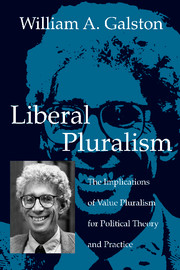Book contents
- Frontmatter
- Contents
- Acknowledgments
- LIBERAL PLURALISM
- I INTRODUCTION
- II FROM VALUE PLURALISM TO LIBERAL PLURALIST THEORY
- 2 Two Concepts of Liberalism
- 3 Three Sources of Liberal Pluralism
- 4 Liberal Pluralist Theory: Comprehensive, Not Political
- 5 From Value Pluralism to Liberal Pluralist Politics
- 6 Value Pluralism and Political Community
- III THE PRACTICE OF LIBERAL PLURALISM
- Index
4 - Liberal Pluralist Theory: Comprehensive, Not Political
Published online by Cambridge University Press: 20 March 2010
- Frontmatter
- Contents
- Acknowledgments
- LIBERAL PLURALISM
- I INTRODUCTION
- II FROM VALUE PLURALISM TO LIBERAL PLURALIST THEORY
- 2 Two Concepts of Liberalism
- 3 Three Sources of Liberal Pluralism
- 4 Liberal Pluralist Theory: Comprehensive, Not Political
- 5 From Value Pluralism to Liberal Pluralist Politics
- 6 Value Pluralism and Political Community
- III THE PRACTICE OF LIBERAL PLURALISM
- Index
Summary
THE REJECTION OF COMPREHENSIVE THEORY AS A BASIS FOR POLITICAL THEORY
Even if value pluralism is accepted as the most adequate comprehensive account of the structure of the valuational universe, one may deny that this theory of value has any relevance to political philosophy. John Rawls has argued that arguments in support of fundamental political values must be decoupled from comprehensive doctrines. This is because “a basic feature of democracy is the fact of reasonable pluralism – the fact that a plurality of conflicting reasonable comprehensive doctrines, religious, philosophical, and moral, is the normal result of its culture of free institutions. Citizens realize that they cannot reach agreement or even approach mutual understanding on the basis of their irreconcilable comprehensive doctrines.”
This fact, Rawls argues, is fraught with moral significance. When citizens offer one another reasons for mutually binding forms of social organization and cooperation, they should confine themselves to “political values that others, as free and equal citizens might also reasonably be expected reasonably to endorse.” If they do not, the proposed decisions tacitly deny the freedom and equality of citizens who feel conscientiously impelled to oppose those decisions. Reasons appealing to comprehensive conceptions rejected by one's fellow citizens violate this requirement, and public justifications of basic public institutions and policies must therefore avoid them. Instead, public reasons should appeal to freestanding political values, such as those mentioned in the Preamble to the Constitution – the common defense, general welfare, domestic tranquility, and so forth.
- Type
- Chapter
- Information
- Liberal PluralismThe Implications of Value Pluralism for Political Theory and Practice, pp. 39 - 47Publisher: Cambridge University PressPrint publication year: 2002



